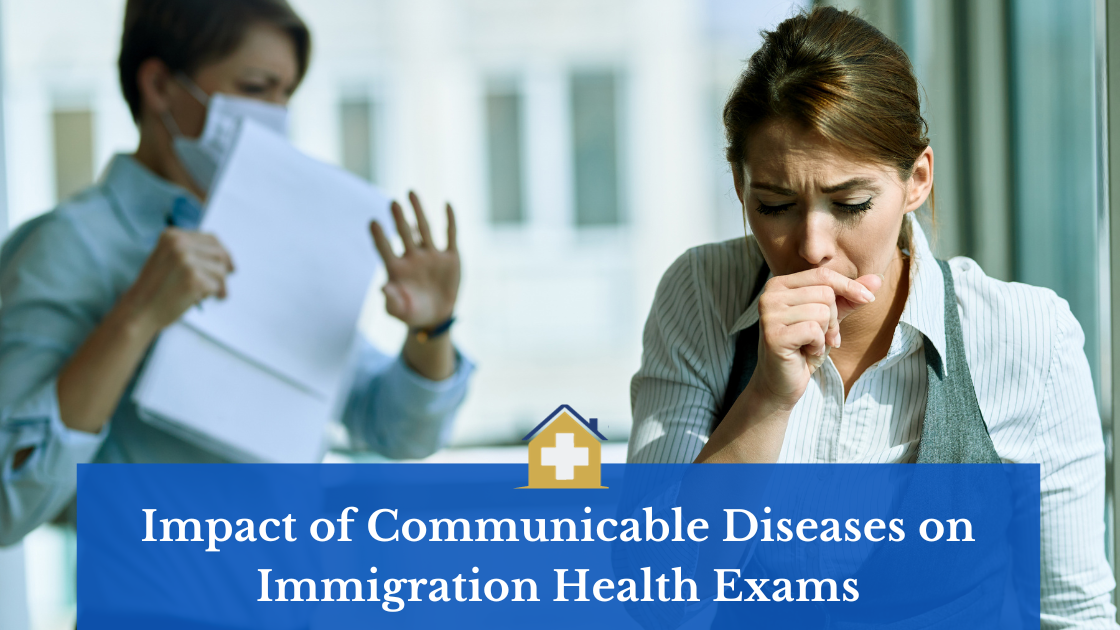


The immigration medical exam is one of the most important steps towards getting a work visa for entering the United States of America. Vaccination records are also checked to ensure the candidate poses no threat to the US population. Continue reading to learn the impact of communicable diseases on the immigration medical exam.
Particular emphasis is laid on applicants who have certain communicable ailments. As per the policy manual of US Citizenship and Immigration Services, Chapter 6, any applicant with a contagious disease of public health significance will be inadmissible to the country. The impact of infectious diseases can be disastrous, possibly affecting millions of general people in any country.
The Department of Health and Human Services (HHS) has marked these conditions below as communicable diseases of public health significance, which apply to immigration medical examinations held in the United States.
With positive test reports for these conditions, the immigration process will be delayed for these candidates. They will not get a clearance for the immigration medical exam until treatment is complete.
Tuberculosis, also known as TB, is caused by Mycobacterium tuberculosis. TB affects the lungs primarily. It is mainly of two types – active TB infection and latent TB infection. Patients with latent TB are infected but still not in the contagious stage. However, active TB is airborne and highly contagious.
Patients with active TB infection may display prominent symptoms like a bad cough that lasts for a long time, severe weight loss, chest pain, fever, fatigue, and blood in the cough. Diagnosis is done through sputum tests and X-rays. Positive applicants are sent to the health department for further testing. A TB specialist must be consulted for treatment.
CDC policies and practices are followed throughout the therapy course. Once the course is complete, tests are done to confirm treatment success.
Latent TB has no symptoms, making it difficult for people to understand that they have a serious infection. This kind of TB is not contagious yet and doesn’t get diagnosed through an X-ray or sputum test. However, people with latent TB might develop active TB in the future, and this potential medical disaster can be prevented with treatment.
When a person tests positive but does not indicate active TB, a latent TB diagnosis is made. For immigration purposes, a blood test called IGRA is used for TB screening. If you are diagnosed with latent TB, you will be medically cleared for TB for your immigration medical exam. Treatment is highly recommended but not required by the USCIS.
A bacterial infection caused by Treponema pallidum, syphilis primarily spreads through sexual contact. Apart from this, the bacteria enter the system through mucous membranes and broken skin and cause infection. Infected pregnant women may also pass on the disease to their unborn children (congenital syphilis). There are different stages of syphilis infections.
There are two stages in acute syphilis infection – primary and secondary. Primary syphilis has symptoms after 10-90 days of contracting the bacteria. There might be a painless pustule on the genitals, rectum, or mouth. The blisters disappear within a few days but are highly infectious.
Secondary syphilis develops between 6-9 months of contracting the infection with symptoms like fever, bone and joint pain, weight loss, headache, general malaise, and a characteristic rash, particularly on the palms and soles.
Applicants diagnosed with syphilis are categorized as Class A and will not get clearance in the immigration medical examination until they are treated.
An antibiotic medication, penicillin, is used for treating syphilis at all stages. Acute syphilis may require only a single dose of penicillin given by injection. After this, the candidate is reclassified as Class B and passes the immigration test.
Latent syphilis is diagnosed through serological tests. This infection may not display any kind of signs and symptoms. It is the most common syphilis, diagnosed during the immigration medical examination.
The screening process and the treatment for latent syphilis infection are the same as for acute syphilis infection. It takes 2-3 weeks to complete treatment, after which the applicant is given clearance for an immigration medical exam.
Immigration applicants aged 18-24 years must clear the immigration medical examination for gonorrhea. It is a sexually transmitted infection, and people suffering from it are classified under Class A. Post-treatment, the condition turns into Class B, and the applicant qualifies.
Urine screening is the mode of the USCIS gonorrhea test. Once diagnosed, the patient undergoes antibiotic treatment per the CDC’s STI guidelines. Details of the diagnosis and treatment are included in the immigration medical form.
Testing positive for an infectious disease in an immigration medical examination comes with a physical and emotional setback. The impact of contagious disease extends not only to the family of the affected but to the society and country at large.
However, these diseases can be combated with proper diagnosis and timely treatment. The civil surgeon and the health department guide candidates in this matter. There are also many private organizations and agencies helping people cope with such communicable diseases.
With the correct information about infectious diseases and adequate support, managing these diseases becomes less challenging. To know more about these diseases, their tests, and treatments before the immigration medical examination, consult Dr Steven Wittenberg Gordon, MD. We have vast experience in immigration medical exams and medication. Contact us for further details.